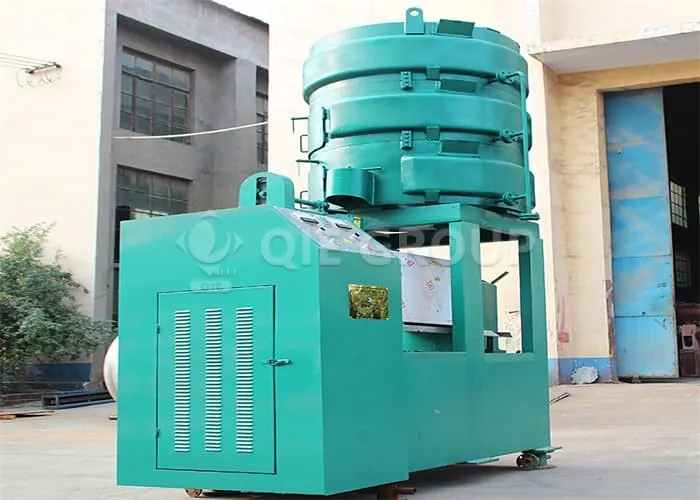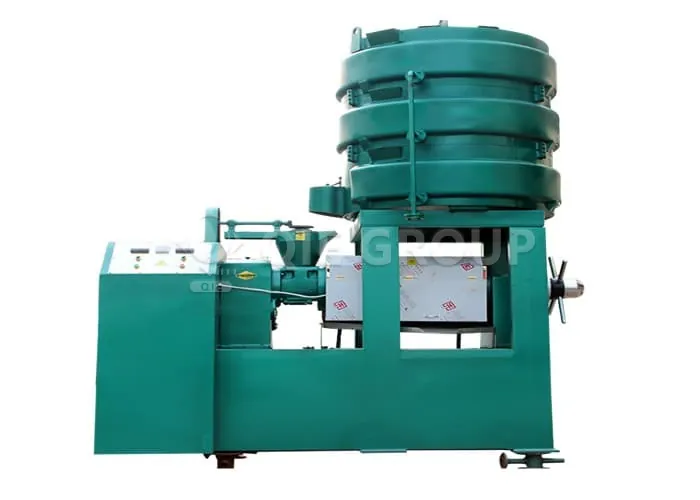In the coconut oil processing industry, equipment selection often determines a factory's efficiency and profit. Many enterprises get "confused" by the various models and parameters of coconut screw oil presses during the early stages of factory setup, only to find after commissioning that the oil yield is low, energy consumption is high, and the equipment breaks down frequently.
In fact, the problem is not whether the equipment is "expensive" or "cheap," but whether it truly matches your raw materials and process requirements.

In coconut oil production lines, screw oil presses have become the core equipment for both hot pressing and cold pressing processes due to their compact structure, continuous oil output, and high automation level. Different model configurations and capacity ranges directly affect the line’s oil yield and energy consumption.
QIE Group’s coconut screw oil presses cover a variety of specifications, customizable for anything from small oil mills to large continuous production lines.
Customers can choose the appropriate model based on raw material types, daily production targets, and process flow:
✅ Daily Processing Capacity: Flexible configuration from 200 kg/h to 1000 tons/day, suitable for everything from home workshops to medium and large oil mills.
✅ Residual Oil Rate: The equipment is optimized by design to typically control residual oil within 2–3% stably.
✅ Drive Power and Pressing Speed: Parameters can be adjusted according to raw material characteristics (dried coconut, fresh coconut, or mixed materials) to balance oil yield and oil quality.
✅ Automation and Control System: Optional PLC intelligent control enables precise linkage of key steps such as temperature, pressure, and slag discharge.
Rather than “choosing equipment,” it is better described as selecting the line solution that best fits your raw material and process. The right oil press not only reduces energy consumption and labor input but also maintains oil aroma and clarity while ensuring stable oil output.
A dried coconut oil factory located in Indonesia once used a traditional batch pressing process. Later, they upgraded to our fully automated coconut screw oil press line (including automatic feeding, temperature-controlled pressing, and intelligent slag discharge system), resulting in about a 35% increase in oil yield and a reduction of residual oil to 2.3%.
This is not simply a “machine replacement,” but the effect brought by process coordination across the entire line.
For example, the preheating section’s temperature needs to precisely match the pressing section’s pressure to soften the coconut meat fully without burning it. Along with automatic temperature control and continuous slag discharge, the system truly achieves efficient unattended production.

Q1: Why is the residual oil rate of the machine I bought higher than the advertised data?
A: In most cases, it’s not a machine problem but caused by uneven raw material moisture, improper pressing gap adjustment, or insufficient motor torque. It is recommended to regularly check raw material moisture and re-calibrate equipment parameters.
Q2: Are all coconuts suitable for the same oil press?
A: Not necessarily. For example, Malaysian brown-shell coconuts have harder fibers, while Filipino white coconuts are softer. It is advised to conduct small-scale trials before selection to confirm if pressing temperature and screw structure match.
Q3: Is pre-treatment required before pressing coconuts?
A: Yes. Pre-treatment (crushing, drying, softening) can significantly improve pressing efficiency and reduce residual oil. Pressing coconut meat with too high moisture content directly can cause clogging, jamming, or reduced oil yield.
Q4: What is the difference between pressing dried coconut and fresh coconut?
A: Dried coconut is mainly used for hot pressing, with higher oil content but harder fibers; fresh coconut is more suitable for cold pressing, preserving natural aroma and nutrients. QIE Group can configure corresponding heating or cold pressing systems based on different raw materials.
Q5: What maintenance should be noted for equipment in high temperature and humidity regions (such as Indonesia, the Philippines)?
A: It is recommended to enhance moisture and rust protection for motors and regularly check the ventilation of the electrical control cabinet. Using stainless steel housing with anti-corrosion coatings can also extend equipment life.
Q6: Can QIE Group provide complete line design and onsite installation? A: Yes. We offer one-stop services from solution design, equipment manufacturing, installation commissioning to staff training, and support remote guidance and spare parts supply for overseas projects.
Choosing equipment that truly understands coconut oil processes is not just about reducing equipment costs, but about making every drop of oil count.
Relying on years of coconut oil project experience, QIE Group provides customers with fully customized solutions covering pre-treatment, screw pressing, refining, and packaging, helping factories move from “being able to produce” to “high efficiency and benefits.”
Fill in your requirements, and we will provide you with detailed equipment quotations and delivery schedules.








